MercoPress. South Atlantic News Agency
Tag: Sergio Massa
-
Saturday, August 12th 2017 - 11:08 UTC
Argentina' final sprint to the midterm elections; the primary cost the central bank US$ 1.8bn
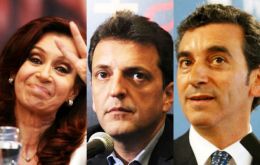
With trading much more relaxed on Friday ended the several days of money market uncertainty leading to Argentina Sunday´s primary election, an anticipation of what can happen in the midterm elections of 22 October when President Mauricio Macri's economic reforms will be put to test in the polls, and hopefully his coalition will increase its congressional support.
-
Friday, August 11th 2017 - 08:32 UTC
Argentina Sunday's primary election: a re-edition of the Cristina Fernandez/Macri dispute
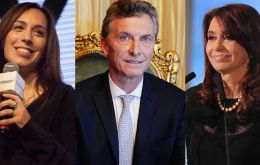
On Sunday Argentines will be able to choose their candidates to the Senate and Lower House for the midterm October elections, in a process known as PASO, which means open mandatory, simultaneous primaries for all parties, but which are not compulsory for the electoral roll.
-
Tuesday, June 14th 2016 - 09:04 UTC
Macri's coalition trips in a mayoral race and suffers unnecessary exposure

Mauricio Macri's ruling coalition, “Let's Change” suffered its first electoral defeat since winning the presidential runoff last November, at a mayoral competition in the city of Rio Cuarto, Córdoba province last Sunday.
-
Monday, June 6th 2016 - 11:01 UTC
Support for Macri remains strong despite tough economic measures

A majority of Argentines continue to support president Mauricio Macri despite a raft of unpopular measures, public utilities rate increases, inflation, redundancies and slower activity, which his administration has been forced to implement in the first six months of his mandate in an attempt to reorganize the country's economy.
-
Saturday, January 23rd 2016 - 08:01 UTC
Macri and Obama could meet at the end of March, reestablishing formal bilateral dialogue

Mauricio Macri expects to meet with Barack Obama at the end of next March when the Argentine president attends in Washington the summit on Nuclear Security of which Argentina is a member. The event takes place between 31 March and first April, and if the meeting effectively takes place, it would mean the return of the formal dialogue between the two countries, rather frozen under his predecessor Cristina Fernandez.
-
Friday, January 22nd 2016 - 04:45 UTC
Macri/Cameron coincide on new relationship; Falklands left for further on
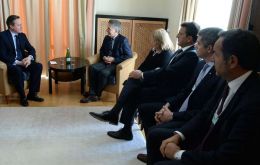
Argentine President Mauricio Macri met on Thursday with British Prime Minister David Cameron in Davos as both leaders attend the World Economic Forum in Switzerland. The atmosphere of the meeting was described as 'very positive' and several steps of a new relationship were announced, while the Falklands/Malvinas issue was left for further on.
-
Friday, January 22nd 2016 - 04:15 UTC
US announced support for Argentina at multilateral development banks
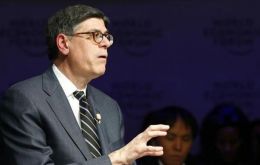
The United States is ending its policy of opposing most lending to Argentina from multilateral development banks, the US Treasury Department announced. US Treasury Secretary Jack Lew informed Argentine Finance Minister Alfonso Prat-Gay of the move on Thursday when the two met in Davos, Switzerland, the department said in a statement.
-
Thursday, January 7th 2016 - 08:17 UTC
Macri will become first Argentine president to attend Davos forum in twelve years
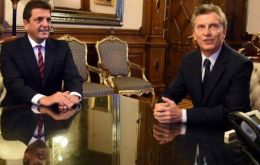
For the first time in twelve years and Argentine president will be attending the World Economic Forum in Davos, Switzerland that runs between January 20-23. President Mauricio Macri will be present together with ally Sergio Massa, leader of dissident Peronist Renewall Front, in order to attract investment.
-
Thursday, November 19th 2015 - 07:27 UTC
Argentina: Massa “believes Macri wins”, but Scioli is “still fighting and much alive”

Sergio Massa, the third contender in the Argentine presidential dispute and who did not make it to the runoff last 25 October, but managed 21% of ballots, some five million votes, compared to incumbent Daniel Scioli's 37% and Mauricio Macri's 34%, has been very careful in advancing whom he would support or recommend to vote on Sunday 22 November.
-
Saturday, November 14th 2015 - 12:48 UTC
Argentine analyst says 8% decide their vote on Election Day
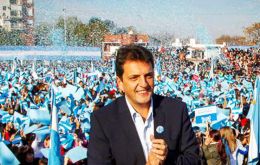
There is an 8% of voters who decide on ballot day whom they prefer and will support, and “they definitively decide the election, even more when it's a runoff”, according to Jorge Giacobbe an Argentine political pollster and analyst.
